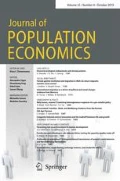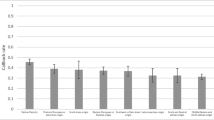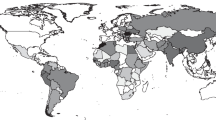Abstract
We develop a model in which nonwhite individuals are defined with respect to their social environment (family, friends, and neighbors) and their attachments to their culture of origin (religion or language), and in which jobs are mainly found through social networks. We find that depending on how strong peer pressures are, nonwhites choose to adopt “oppositional” identities because some individuals may identify with the dominant culture and others may reject that culture, even if it implies adverse labor market outcomes.
Similar content being viewed by others
References
Ainsworth-Darnell JW, Downey DB (1998) Assessing the oppositional culture explanation for racial/ethnic differences in school performance. Am Sociol Rev 63(4):536–553
Akerlof GA (1997) Social distance and social decisions. Econometrica 65(5):1005–1027
Akerlof GA, Kranton RE (2000) Economics and identity. Q J Econ 105(3):715–753
Akerlof GA, Kranton RE (2002) Identity and schooling: some lessons for the economics of education. J Econ Lit 40(4):1167–1201
Austen-Smith D, Fryer RD Jr (2005) An economic analysis of ‘acting white’. Q J Econ 120(2):551–583
Battu H, Zenou Y (2006) Oppositional identities in England. Mimeo, Research Institute of Industrial Economics
Becker GS (1957) The economics of discrimination. Chicago University Press, Chicago
Bernal ME, Knight GP (1993) Ethnic identity: formation and transmission among Hispanics and other minorities. State University of New York Press, Albany
Borjas GJ (1994) The economics of immigration. J Econ Lit 32(4):1667–1717
Calvó-Armengol A (2004) Job contact networks. J Econ Theory 115(1):191–206
Calvó-Armengol A, Jackson MO (2004) The effects of social networks on employment and inequality. Am Econ Rev 94(3):426–454
Calvó-Armengol A, Zenou Y (2005) Job matching, social network and word-of-mouth communication. J Urban Econ 57(3):500–522
Chiswick BR (1978) The effect of Americanization on earnings of foreign born men. J Polit Econ 86(5):897–921
Cutler D, Glaeser EL, Vigdor JL (1999) The rise and decline of the American ghetto. J Polit Econ 107(3):455–506
Diamond P (1981) Mobility costs, frictional unemployment, and efficiency. J Polit Econ 89(4):798–812
Delpit L (1995) Other people’s children: cultural conflict in the classroom. The Free Press, New York
Dustmann C, Fabbri F (2003) Language proficiency and labour market performance of immigrants in the UK. Econ J 113(489):695–717
Farkas G, Lleras C, Maczuga S (2002) Does oppositional culture exist in minority and poverty peer groups. Am Sociol Rev 67(1):148–155
Fershtman C, Weiss Y (1998) Social rewards, externalities and stable preferences. J Public Econ 70(1):53–73
Fordham S, Ogbu JU (1986) Black students’ school success: coping with the burden of acting white. Urban Rev 18(3):176–206
Fryer RG Jr, Torelli P (2005) An empirical analysis of ‘acting white.’ NBER Working Paper No. 11334
Gilbertson GA, Fitzpatrick JP, Yang L (1996) Hispanic intermarriage in New York City: new evidence from 1991. Int Migr Rev 30(2):445–459
Iannaccone LR (1998) Introduction to the economics of religion. J Econ Lit 36(3):1465–1496
Ihlanfeldt K, Scafidi B (2002) Black self-segregation as a cause of housing segregation. Evidence from the multi-city study of urban inequality. J Urban Econ 51(2):366–390
Lazear EP (1999) Culture and language. J Polit Econ 107(6):S95–S126
The Guardian (2005) Learning from each other. The Guardian, UK (Tuesday, November 8)
Logan JR, Alba RD, Leung S-Y (1996) Minority access to white suburbs: a multiregional comparison. Soc Forces 74(3):851–881
Massey DS, Mullan BP (1984) Processes of Hispanic and black spatial assimilation. Am J Sociol 89(4):836–873
McManus WS, Gould W, Welch F (1983) Earnings of Hispanic men: the role of English language proficiency. J Labor Econ 1(2):101–130
Modood T et al (1997) Ethnic minorities in Britain: diversity and disadvantage. Policy Studies Institute, London
Montgomery J (1991) Social networks and labor-market outcomes: toward an economic analysis. Am Econ Rev 81(5):1408–1418
Mortensen DT, Vishwanath T (1994) Personal contacts and earnings. It is who you know! Labour Econ 1(2):187–201
Ogbu JU (1978) Minority education and caste. Academic, New York
Patacchini E, Zenou Y (2006) Racial identity and education. CEPR discussion paper 5607
Peach C (2005) Social integration and social mobility: spatial segregation and intermarriage of the Caribbean population in Britain. In: Loury GC, Modood T, Teles SM (eds) Ethnicity, social mobility, and public policy: comparing the US and UK. Cambridge University Press, Cambridge, pp 178–203
Pissarides CA (2000) Equilibrium unemployment theory, 2nd edn. MIT Press, Cambridge, MA
Portes A, Nash Parker R, Cobas JA (1980) Assimilation or consciousness: perception of U.S. society among recent Latin American immigrants to the United States. Soc Forces 59(1):200–224
Selod H, Zenou Y (2006) City-structure, job search, and labor discrimination. Theory and policy implications. Econ J (in press)
Topa G (2001) Social interactions, local spillovers and unemployment. Rev Econ Stud 68(2):261–295
Vives X (1999) Oligopoly pricing: old ideas and new tools. MIT Press, Cambridge, MA
Author information
Authors and Affiliations
Corresponding author
Additional information
Responsible editor: Christian Dustmann
Rights and permissions
About this article
Cite this article
Battu, H., Mwale, M. & Zenou, Y. Oppositional identities and the labor market. J Popul Econ 20, 643–667 (2007). https://doi.org/10.1007/s00148-006-0093-8
Received:
Accepted:
Published:
Issue Date:
DOI: https://doi.org/10.1007/s00148-006-0093-8




